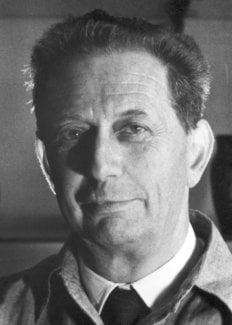André Lwoff
Biographical

André Michel Lwoff was born on 8 May 1902 in Ainay-le-Château (Allier). He joined the Institut Pasteur at the age of 19. He had graduated in science and had done one year of medicine. Lwoff completed his studies while working in the laboratory. In 1921, he had the good fortune to study under a very great microbiologist, Edouard Chatton; Lwoff remained his colleague for seventeen years. It was through him that Lwoff joined the Institut Pasteur in the laboratory of Félix Mesnil. His first investigations were on the parasitic ciliates, their developmental cycle, and morphogenesis. Later, he worked on the problems involved in the nutrition of protozoans. André Lwoff obtained his M. D. in 1927 and his Ph. D. in 1932.
In 1932-1933 a grant from the Rockefeller Foundation enabled him to spend a year in Heidelberg in the laboratory of Otto Meyerhof. He studied haematin – a growth factor for the flagellates – the specificity of protohaematin, its quantitative effect on growth, and the part it played in the respiratory catalyst system.
Then in 1936, again with the aid of a grant from the Rockefeller Foundation, Lwoff and his wife spent seven months in Cambridge in the laboratory of David Keilin; factor V, which is required by Haemophilus influenzae, was identified with cozymase and its physiological role for the bacterium was defined.
There were many other investigations on growth factors for flagellates and ciliates with regard to growth factors, loss of function, and physiological development until the time when Lwoff began working on the problem of lysogenic bacteria.
Dr. Lwoff was appointed Head of the Department at the Institut Pasteur in 1938, and Professor of Microbiology at the Science Faculty in Paris in 1959.
The observation of isolated bacteria led him to the conclusion that lysogenic bacteria did not secrete bacteriophages, that the production of bacteriophages led to the death of the bacterium, and above all that this production must be induced by external factors. It was this hypothesis which, together with Louis Siminovitch and Niels Kjeldgaard, led Lwoff to discover the inductive action of ultraviolet irradiation (1950).
In 1954 Prof. Lwoff began studying poliovirus. Experiments on the relations between the temperature sensitivity of viral development and neurovirulence led him to consider the problem of viral infection. In this way it became clear that non-specific factors play an important part in the development of the primary infection. He has now begun to investigate the action mechanism of specific inhibitors of viral development.
André Lwoff has been honoured by the following prizes of the Académie des Sciences: Lallemant, Noury, Longchampt, Chaussier, Petit d’Ormoy prizes and the Charles-Léopold Mayer Foundation prize. He also received the Barbier prize from the Académie de Médecine, and the Leeuwenhoek Medal of the Royal Netherlands Academy of Science and Arts (Amsterdam, 1960), as well as the Keilin Medal of the British Biochemical Society (1964).
He is a Honorary Member of the Harvey Society (1954), of the American Society of Biological Chemists (1961), of the Society for General Microbiology (1962), and a Corresponding Member of the Botanical Society of America (1956).
He is President of the International Association of Microbiological Societies, and a Member of the International Committee for the Organization of Medical Sciences. He is a Member of the Société Zoologique de France, of the Société de Pathologie exotique, of the Société de Biologie and president of the Société des Microbiologistes de langue française. Furthermore a Honorary Member of the New York Academy of Sciences (1955), Honorary Foreign Member of the American Academy of Arts and Sciences (1958), Associate of the National Academy of Sciences of the United States of America (1955), and a Foreign Member of the Royal Society, London (1958).
He holds honorary degrees from the following universities: Chicago (D. SC., 1959), Oxford (D.Sc., 1959), Glasgow (Doctor of Laws, 1963) and Louvain (M. D., 1966).
This autobiography/biography was written at the time of the award and first published in the book series Les Prix Nobel. It was later edited and republished in Nobel Lectures. To cite this document, always state the source as shown above.
André Lwoff died on September 30, 1994.
Nobel Prizes and laureates
Six prizes were awarded for achievements that have conferred the greatest benefit to humankind. The 14 laureates' work and discoveries range from quantum tunnelling to promoting democratic rights.
See them all presented here.
